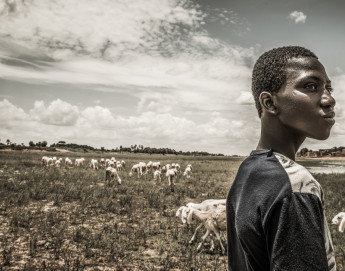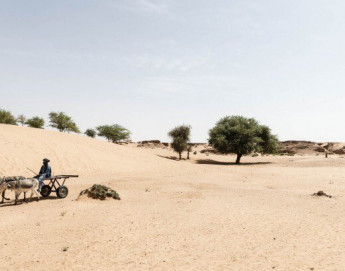
Climate change and conflict: Impact on displacement

A little over a year ago, the COVID-19 pandemic brought the world down to its knees. No country was spared the wrath, revealing how vulnerable we are to disasters and emergencies. Climate change is one such disaster looming over us.
Recently, experts got together to unpack the impact of disasters and conflict on displacement from the lens of environmental degradation, limited access to public health and other essential services. The digital conversation was hosted by the ICRC, New Delhi, in partnership with the O. P. Jindal Global University – Jindal School of Environment and Sustainability (JSES). The idea was to focus on factors contributing to both internal displacement and forced environmental migration.
The combined effects of climate change, environment and conflict risks affect all dimensions of people's lives. From their safety to their health, food and water to economic security – every aspect is affected. Along with other megatrends, such as demographic growth or rapid urbanization, they can shape migration and displacement or access to resources on a continental scale.

Displacement/migration tends not to be people's primary means of adaptation, but in the absence of options many end up moving, usually within their own country – although the poorest and most vulnerable are sometimes trapped in place. People often end up in poor urban areas where they continue to be exposed to other hazards.
The panel, moderated by professor (Dr) Sneha Krishnan, associate professor, JSES, included professor (Dr) Cosmin Corendea, professor and vice dean, JSES, Mariam Traore Chazalnoel, senior expert, Migration, Environment and Climate Change, United Nations International Migration Agency and Yahia Alibi, head of regional delegation, ICRC New Delhi.
Professor Cosmin spoke at length about the causality and consequences of climate change and its immediate impact on displacement and human rights of affected communities. According to him, human mobility, climate change and the environment are interrelated. Migration, displacement and planned relocation are affected in different ways by climatic and environmental changes. Cosmin stressed on the need to accelerate the development of policies addressing disasters and displacement. These policies would aid governments in responding better to the crisis.
Mariam Chazalnoel spoke about the interplay between human mobility, climate change and the environment. According to her, environmental movement is linked to a combination of factors. There are several drivers that motivate the decision to move. Based on a research conducted in Mali for instance, the majority of people chose to move due to the ongoing conflict.
However, the reason to move was also connected to climate change and environment issues mainly drought which makes it impossible to sustain livelihoods. This proves that the combined effects of disasters, environmental degradation and conflict are massive.
In 2019, 33 million people worldwide were displaced within their own countries. Of these eight million were conflict migrants.
Speaking specifically on the intersection between climate change and conflict, Alibi stated that though the consequences of climate change are felt everywhere, its most crippling effects are borne by the world's most vulnerable communities. This includes people living in situations of conflict and violence who are disproportionately impacted by climate change risks.
Out of the 20 countries considered the most vulnerable to the impact of climate change (by the ND-Gain Index), 13 are also affected by an armed conflict. Conflicts harm assets required to facilitate the absorption of the shocks and adaptation, such as institutions, markets and livelihood. People in such circumstances are especially impacted by food insecurity, rising food prices, income losses, health impacts and displacement.
Alibi emphasized that the solutions for the future must be directed not only toward mitigating climate change through reducing emissions but also complemented by measures to help people and communities adapt.
Panellists also spoke of the need to invest in disaster prevention, and in designing programs that help people secure resilient livelihoods and shelters and that contribute to the resilience of essential services.
Discussions also considered the gendered dimensions of displacement. Speakers agreed that women and men experience migration and displacement in different ways. Women almost always tend to be more vulnerable and thus projects designed to assist communities must ensure that the burdens felt by women are eased and not enhanced.
Conclusion was that no one can address these challenges alone, we must work together across the humanitarian sector and beyond to strengthen climate change action. Complementary humanitarian and development efforts are critical.



